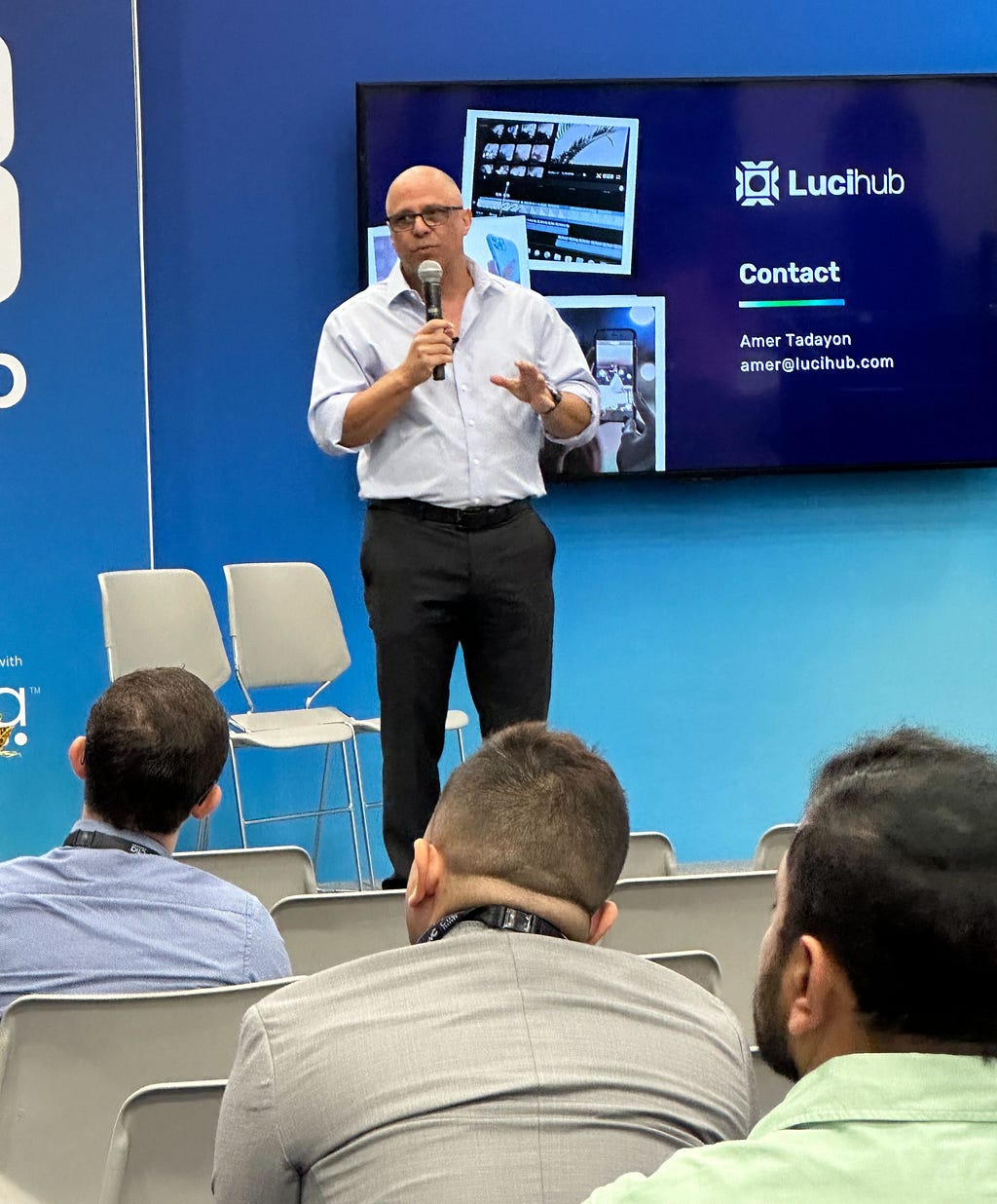C-Suite Perspectives On AI: Amer Tadayon Of Lucihub On Where to Use AI and Where to Rely Only on Humans
An Interview With Kieran Powell
What level of quality can AI deliver for the tasks required. We are in the creative business, and at its core, art and design rely on more than just logic and patterns. Artistic expression is deeply tied to human creativity and is incredibly subjective. In my opinion, it will always require human touch at some level.
As artificial intelligence (AI) continues to advance and integrate into various aspects of business, decision-makers at the highest levels face the complex task of determining where AI can be most effectively utilized and where the human touch remains irreplaceable. This series seeks to explore the nuanced decisions made by C-Suite executives regarding the implementation of AI in their operations. As part of this series, we had the pleasure of interviewing Amer Tadayon.
Amer is a seasoned professional with extensive expertise in the media and technology sectors. With a successful track record as an executive and entrepreneur, he has held leadership positions in prominent companies like IBM, Cognizant, and frog design. Amer’s exceptional leadership skills have driven growth and fostered innovation throughout his career. Leveraging his comprehensive understanding of the media and technology landscape, he’s been the driving force behind the innovation at Lucihub.
Thank you so much for your time! I know that you are a very busy person. Our readers would love to “get to know you” a bit better. Can you tell us a bit about your ‘backstory’ and how you got started?
Over the years, I’ve become a generalist. My background in music and Computer Science led to careers in software, film and technology and product consulting. I have experience working for fortune 500 companies and launched several startups.
It has been said that our mistakes can be our greatest teachers. Can you share a story about the funniest mistake you made when you were first starting? Can you tell us what lesson you learned from that?
It wasn’t so much a mistake as it was a great life lesson and a funny story. When I was in college at Cal Poly, I desperately wanted an internship at Apple as a programmer. I wasn’t selected for an interview, so I decided to wait by the interviewer’s door. Every time the interviewer would come out for a break, he would see me. I finally gathered the courage to stop him and said, “If someone cancels, of if you have time at the end of your schedule, could I get an interview?”
Four hours later, he stuck his head out of the office and said, “You’re still here? Well, come on in.” The interview itself was an absolute disaster, but I was so excited just to have made it into that room, that I didn’t care. Going through the door was the real win for me that day, and it taught me the value of determination. In hindsight, the mistake was thinking I could land a job that was designed for students two years ahead of me.
Are you working on any exciting new projects now? How do you think that will help people?
I am currently developing a company that connects the dots across all aspects of my career experience. Our company is an AI-powered video production platform designed to democratize professional video production. By leveraging AI technology and human expertise, we deliver professionally created content quickly and at scale. You film, we take care of the editing, delivering a polished, professionally edited video within hours.
Thank you for that. Let’s now shift to the central focus of our discussion. In your experience, what have been the most challenging aspects of integrating AI into your business operations, and how have you balanced these with the need to preserve human-centric roles?
I’m fortunate, our business has been AI from day one so it’s in our DNA. We also believe the path to success lies in combining AI with human-centric roles, not relying solely on AI. Every department in our company uses AI, enabling us to do much more with fewer resources, which has been invaluable for a young company like ours. There’s no doubt AI will eliminate certain roles; it will also create new ones. For us, it’s been a redistribution of people, allowing us to invest more in certain teams because we are saving resources elsewhere.
Can you share a specific instance where AI initially seemed like the optimal solution but ultimately proved less effective than human intervention? What did this experience teach you about the limitations of AI in your field?
This is something we look at daily in our business: determining where can we fully automate an edit. The answer is, not too many places. Design and creative are inherently human-centric and subjective, and AI alone doesn’t get you 100 percent there, whether you do it yourself or have a professional editor involved.
How do you navigate the ethical implications of implementing AI in your company, especially concerning potential job displacement and ensuring ethical AI usage?
For us, it hasn’t been about displacement but redistribution. We have transitioned very talented employees from one team to another. I can imagine this will be more challenging for larger companies.
Could you describe a successful instance in your company where AI and human skills were synergistically combined to achieve a result that neither could have accomplished alone?
Our mission is to transform professional production and editing. Today’s digital landscape requires companies to “feed the beast;” it’s no longer about creating a few videos a year but generating new content weekly and delivering them before the hype dies. Traditional production companies and agencies struggle to keep up with their clients’ demands. We created Lucihub to solve this major challenge. We produce quality videos quickly and at scale. The speed and scale are made possible by AI, while the quality would not be achievable without the people.

Based on your experience and success, what are the “5 Things to Keep in Mind When Deciding Where to Use AI and Where to Rely Only on Humans, and Why?” How have these 5 things impacted on your work or your career?
1 . The first thing I consider is the problem we aim to solve. Today, AI is great at performing certain tasks. For example, our platform uses AI to streamline workflows and processes, it excels at these sorts of tasks. Using AI like this has really made us work smarter and faster.
2 . What level of quality can AI deliver for the tasks required. We are in the creative business, and at its core, art and design rely on more than just logic and patterns. Artistic expression is deeply tied to human creativity and is incredibly subjective. In my opinion, it will always require human touch at some level.
3 . What is the cost. Building production-ready AI tools and products can get expensive. You ‘ve got infrastructure costs, API calls, designers, engineering — you name it. But it is worth making that investment to tackle the problem you’re trying to solve? Well, sometimes the answer is simply no!
4 . Ethical and legal: When we are considering building AI into a segment of our product, we carefully assess the ethical and legal implications of output. This is particularly important with our Lucihub creative director, a software component built into our platform that is designed to expedite script and shot list development, among other functions. We must make sure that we aren’t accessing copyrighted material and that we adhere to diversity and inclusion (D&I) compliance standards.
5 . What are the implications if AI fails. In my line of business, I don’t worry about this much. If we fail, nobody gets hurt or dies. However, when implementing AI into fields like autonomous driving or medical devices, a failure can be catastrophic; it’s about life or death.
Looking towards the future, in which areas of your business do you foresee AI making the most significant impact, and conversely, in which areas do you believe a human touch will remain indispensable?
While our service is AI-based, I believe the real impact of AI will be in running the business. Internally, we use our product daily and a host of other AI tools, enhancing our ability to produce more work efficiently, a key competitive advantage for us. In our industry, the human touch will always be indispensable, both within our company and in the products we deliver. We are in the content creation business, where artistic expression is deeply rooted in human creativity. AI serves as a valuable assistant, but it won’t take you to the finish line. Today, you still need human creativity to reach your goals.
You are a person of great influence. If you could start a movement that would bring the most amount of good to the most amount of people, what would that be? You never know what your idea can trigger. 😊
I’m also a professional musician, and I truly believe music is medicine. My next adventure will be finding a way to merge music and technology to get more people involved in the art of making and releasing music.
How can our readers further follow your work online?
Linkedin: https://www.linkedin.com/in/amertadayon/
IG: at.drums
This was very inspiring. Thank you so much for joining us!
About The Interviewer: Kieran Powell is the EVP of Channel V Media a New York City Public Relations agency with a global network of agency partners in over 30 countries. Kieran has advised more than 150 companies in the Technology, B2B, Retail and Financial sectors. Prior to taking over business operations at Channel V Media, Kieran held roles at Merrill Lynch, PwC and Ernst & Young. Get in touch with Kieran to discuss how marketing and public relations can be leveraged to achieve concrete business goals.
C-Suite Perspectives On AI: Amer Tadayon Of Lucihub On Where to Use AI and Where to Rely Only on… was originally published in Authority Magazine on Medium, where people are continuing the conversation by highlighting and responding to this story.
